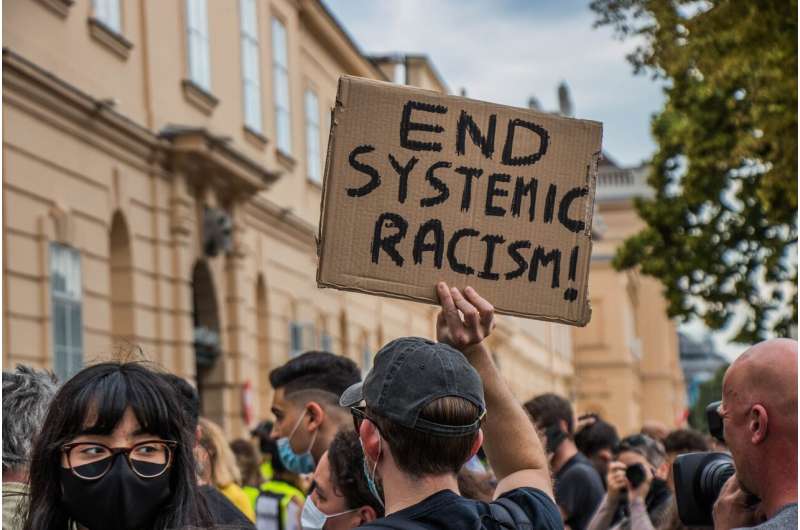

|Carlos Osorio/AP
Republican vice presidential nominee J.D. Vance speaks at a campaign event in Byron Center, Michigan, Aug. 14, 2024.
By Cameron Joseph
CHRISTIAN SCIENCE MONITOR
Updated Aug. 15, 2024
In 2021, JD Vance gave a speech to a conservative think tank on “woke capital” – and accused Amazon of funding Black Lives Matter in order to burn down the competition.
“Who benefits most when small businesses on Main Street are destroyed? Who wants to see their competitors unable to deliver goods and services to people, so that you get it delivered in your brown Amazon box? Jeff Bezos,” Mr. Vance said, referencing the riots that broke out in the summer of 2020, amid a wave of racial justice protests. “The people who are invested in destroying America via our corporate class are also getting rich from it. This is an important piece of the puzzle to understand.”
Mr. Vance has described big business as an enemy of conservative values, accusing many corporations of directly undermining America. It’s a view that has gained traction on the MAGA right in recent years, with conservatives attacking companies like Disney and Budweiser for “woke” messaging and efforts at diversity, equity, and inclusion (DEI) – evidence of the Republican Party’s transformation in the Trump era.
Why We Wrote This
JD Vance’s attacks on “woke capital” go beyond ordinary populism: He’s said Jeff Bezos sought to fund riots and companies don’t want workers having children.
But Mr. Vance doesn’t just think companies are cynically pandering to the marketplace. He’s taken his criticisms a step further, painting corporations’ motivations in a sinister, conspiratorial light.
“If you peel back the onion, what you find is that the businesses that are most connected and most devoted to destroying our values are also benefiting financially from it,” he argued in the speech at a conference in suburban Washington, D.C., hosted by the Claremont Institute, a right-wing California think tank that has emerged as an ally of the MAGA movement.
Since he became a senator last year, Mr. Vance has broken with his party to push a number of populist economic proposals. But it’s his pugnacious rhetoric that has drawn significant public attention since former President Donald Trump selected him as his running mate.
Vance, an abortion ban, and “cheap labor”
In the same 2021 speech, Mr. Vance argued that companies supporting abortion rights really just want a pool of “cheap labor,” with workers unburdened by the cost and time commitment of caring for children. Citing former Georgia Democratic House Minority Leader Stacey Abrams’ assertion that a Georgia abortion ban would be “bad for business,” he said: “She was right. When the big corporations come against you for passing abortion restrictions, when corporations are so desperate for cheap labor that they don’t want people to parent children, she’s right to say that abortion restrictions are bad for business.”
Ms. Abrams had lamented in a 2019 Twitter thread that more business leaders weren’t speaking up against a bill prohibiting most abortions in Georgia. She says in a statement to the Monitor that his comments misrepresented her earlier remarks, while saying he and Mr. Trump “expressed contempt for women’s healthcare.”
“A woman’s access to abortion directly affects her ability to secure an education, find a job and advance and make decisions about how and when to grow a family,” she says in an email. “Companies cannot effectively attract and retain talent when half of the available workforce is denied basic human rights to care and self-determination.”
At a Thursday press availability after this story published, Mr. Vance was asked if he stood by his comments on abortion and companies — and what evidence he had to back it up. He said the evidence he had was "what people actually say," before pivoting to a broader critique of how companies treat young families, citing his own family's experience in the corporate world.
“Very often, corporate America is not especially friendly to parents with young children, and especially moms with young children. And I think we have to promote a culture of pro-family thinking and pro-family policy in this country where we see children as blessings and as resources and not as curses, which is how I think way too many companies and frankly way too many of our leaders in Washington think about our young children," he said.
Thomas Frank, a left-leaning historian and author who has written extensively on American populism, says that Mr. Vance identified a phenomenon that has been going on for years – but took it to an extreme and unsupported conclusion.
“This combination of liberalism and capitalism, this does exist, and it’s real,” says Mr. Frank. But instead of just accusing companies of virtue signaling, Mr. Vance makes a giant leap in framing their rhetoric and actions as part of a sinister plot. Jeff Bezos wanting Main Street to burn? “That sounds like a conspiracy theory to me. I would love to see his evidence for that.”
In July 2020, Amazon pledged $10 million in donations to a dozen social justice organizations, part of a wave of corporations signaling to consumers and their own employees that they shared their values. The company later offered a corporate match that led to $17 million more. Black Lives Matter’s national and local chapters received more than $2 million from Amazon and another $1 million from employee contributions.
The Trump-Vance campaign did not provide any evidence supporting Mr. Vance’s claim that the organizations Amazon donated to had supported the riots that sporadically broke out alongside the widespread, largely peaceful Black Lives Matter protests in 2020.
Recently, Senator Vance has returned to the riots that broke out that summer, claiming that Minnesota Gov. Tim Walz, the Democratic vice presidential nominee, “actively encouraged the rioters” who caused widespread damage in Minneapolis after George Floyd’s murder. Mr. Walz called out the National Guard to restore order, but has faced criticism for not doing it sooner.
Recommended

Liberal or moderate? Depends which Tim Walz you’re talking about.
Mr. Vance achieved fame with a best-selling 2016 memoir, “Hillbilly Elegy,” that was at times critical of the people he’d grown up around in rural Ohio. His political rise was also fueled by patronage from his former boss, Paypal founder and venture capitalist Peter Thiel, who spent $15 million to help elect him to the Senate.
Populist record contrasts with Trump
Mr. Vance’s anti-corporate populism isn’t just rhetorical. As a senator, he’s supported raising the federal minimum wage. After a disastrous train derailment spilled chemicals in East Palestine, Ohio, he teamed up with Ohio Democratic Sen. Sherrod Brown on a bill to tighten train regulations, over protests from other Republicans. And he’s worked with Democrats on legislation to claw back compensation for executives of failed banks and to rein in credit card fees.
Mr. Trump broke with big business conservatives on immigration and trade, two major issues where Mr. Vance agrees with him. But at other times the former president’s populist rhetoric clashed with more business-friendly policies, like massive corporate tax cuts and major deregulation efforts. Mr. Trump has also flip-flopped to embrace companies he once criticized, like TikTok and Tesla, after their major investors promised to back him.
Mr. Vance appears to be more of a pure economic populist. But it’s his aggressive, acerbic rhetoric, rather than his policy views, that have drawn the most attention since Mr. Trump selected him as his running mate.
Mr. Vance’s comments in recent years calling leading Democrats “childless cat ladies,” arguing that people with children should get more votes in elections, and saying that pregnancies caused by rape and incest were “inconvenient” have resurfaced since he joined the ticket – and immediately hurt his image with voters.
Vance’s challenge in poll ratings
Democrats have taken to mocking Mr. Vance as “weird,” and it seems to be working: Polls have shown his favorability ratings are now upside down, making him less popular than Mr. Trump, as well as Vice President Kamala Harris and her running mate. A recent survey from a Democratic pollster showed that reactions to his rhetoric are driving those numbers: “Anti-woman” and “weird” were two of voters’ leading descriptions for Mr. Vance, with the number describing him as “extreme” jumping from 20% in late July to 33% in August.
Mr. Vance has sought to downplay some of his previous comments. He insisted in a Sunday ABC News interview that his suggestion that parents should have extra voting rights was just a “thought experiment” and not a policy proposal he actually supported.
But when asked for comment about his 2021 remarks to the Claremont Institute on abortion and Black Lives Matter, a spokesman for Mr. Vance doubled down.
“Jeff Bezos’s companies promoted and donated to Black Lives Matter as BLM protestors destroyed countless brick and mortar businesses across the country – the very businesses that Amazon counts as direct competitors,” Vance spokesman William Martin says in an emailed statement. “Woke billionaires like Bezos have taken over corporations across the country and turned them against the American people. Senator Vance is absolutely right to call them out and will continue to do so.”
This story was updated in the afternoon on Aug. 15 to include Mr. Vance's response to a question about the abortion comments that the Monitor published earlier in the day.
More 2024 election coverage
As Harris picks Walz, George Floyd riots resurface as election issue
Republican attacks against Vice President Kamala Harris’ running mate, Tim Walz, bring questions of law, order, and the George Floyd protests to the campaign forefront.
Six issues Kamala Harris is campaigning on – and 5 she’d rather avoid
Kamala Harris has the opportunity to rebrand herself in the eyes of voters. Her focus will include protecting abortion rights – and drawing a contrast with Donald Trump on justice.












